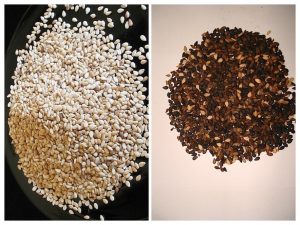White and black sesame seeds are both varieties of the same plant, Sesamum indicum, and they offer similar health benefits. However, there are some differences in terms of appearance, flavor, and nutrient composition. Here are the benefits and differences of white and black sesame seeds:
Benefits of Sesame Seeds:
Nutrient-rich: Sesame seeds are a good source of essential nutrients, including protein, healthy fats, dietary fiber, and a wide range of vitamins and minerals such as calcium, iron, magnesium, and zinc.
Antioxidant properties:
Sesame seeds contain antioxidants, such as sesamin and sesamol, which help protect the body against oxidative stress and reduce inflammation.
Heart health:
The healthy fats present in sesame seeds, including monounsaturated and polyunsaturated fats, can support heart health by reducing bad cholesterol levels and lowering the risk of cardiovascular diseases.
Bone health:
Sesame seeds are rich in calcium, which is essential for maintaining healthy bones and preventing conditions like osteoporosis.
Digestive health:
The fiber content in sesame seeds promotes healthy digestion, helps prevent constipation, and supports gut health.
Blood sugar regulation:
Sesame seeds have a low glycemic index and may aid in stabilizing blood sugar levels, making them a suitable choice for individuals with diabetes or those aiming to manage their blood sugar.
Differences between White and Black Sesame Seeds:
Color:
As the names suggest, the most apparent difference is the color. White sesame seeds are pale, while black sesame seeds have a dark, blackish-brown color.
Flavor:
White sesame seeds have a milder, slightly nutty flavor, while black sesame seeds have a stronger, more intense nutty taste.
Culinary uses:
White sesame seeds are commonly used in a variety of dishes, including baked goods, salads, stir-fries, and as a topping for bread and buns. Black sesame seeds are often used in Asian cuisine, particularly in desserts, such as black sesame paste, sesame balls, and sweet soups.
Nutrient composition:
Although both varieties are nutrient-dense, black sesame seeds tend to have a slightly higher calcium content compared to white sesame seeds. On the other hand, white sesame seeds contain slightly more fiber.



